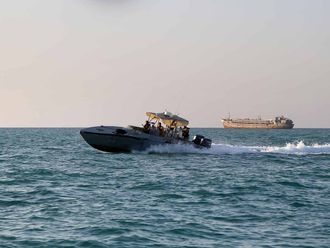Cairo: Egyptian riot police were deployed on Saturday near the presidential palace after a night of clashes between security forces and petrol-bomb-throwing protesters that killed one man and injured nearly 100.
In Cairo’s Tahrir Square, protesters pelted Prime Minister Hesham Qandil’s motorcade with stones when he tried to visit after separate overnight clashes nearby between protesters and police, an Egyptian television channel reported.
A 23 year old was shot dead as police used birdshot and tear gas on demonstrators who targeted the north Cairo presidential palace in rallies against Islamist President Mohammad Mursi late on Friday, a senior medical official said.
Ninety-one people were also injured, said the official, while the interior ministry reported 15 of its men wounded by birdshot.
Police said they made 20 arrests, and were filmed on television beating and dragging a naked man to an armoured vehicle, outraging Mursi critics who compared the incident to practices under deposed president Hosni Mubarak.
The opposition National Salvation Front is to meet later on Saturday to review its strategy after the clashes, which followed its call for people to take to the streets.
On Saturday, there was no sign of any protesters, and streets around the presidential palace reopened to traffic, though they were littered with debris.
The smell of tear gas still lingered near the palace, its outer wall scrawled with graffiti including “Topple the regime” and “Freedom.”
In Cairo’s iconic Tahrir Square, protesters threw stones and bottles at Qandil’s motorcade in the morning, the Dream Live television channel said.
The premier said in a statement he was “confronted by youths and troublemakers” and he “preferred to avoid a confrontation between them and security personnel.”
The presidency said security forces would deal with violent protests with “utmost decisiveness” and that it would hold opposition groups found to have incited the clashes “politically accountable.”
Mursi’s Facebook page said the protesters sparked the violence by trying to break into the palace.
The opposition, which accuses Mursi of betraying the revolution that toppled Mubarak two years ago, distanced itself from the violence and urged demonstrators to exercise “utmost restraint.”
But hours before the violence erupted, NSF leader and Nobel Peace laureate Mohammad Al Baradei suggested unrest would persist if Mursi kept sidelining his opponents.
“Writing on wall: violence and chaos will continue until Mursi and co listen to people’s demands: new government, democratic constitution, independent judiciary,” he wrote on Twitter.
People took to the streets in several cities on Friday in a show of opposition to Mursi and his Muslim Brotherhood after deadly unrest swept Egypt last week in the worst violence since Mursi was elected president in June.
Nearly 60 people died in those clashes, mostly in Port Said, where violence erupted after 21 residents were sentenced to death a week ago over football-related violence last year.
The NSF joined rival Islamists Thursday in condemning violence and supporting efforts for a national dialogue, while insisting on a unity government and the amendment of an Islamist-drafted constitution which has polarised the nation.
The crisis has sapped Mursi’s popularity and complicated negotiations for a crucial $4.8 billion (Dh17.6 billion) IMF loan that could help bail out the teetering economy.












